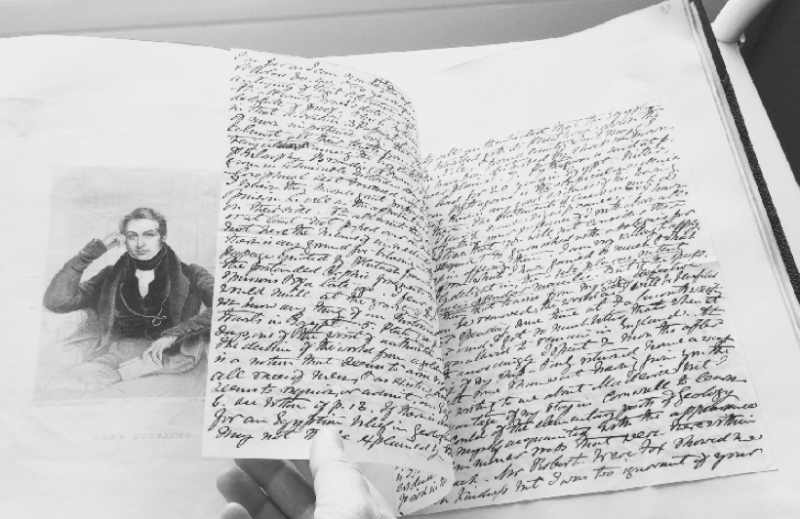Sir Charles Lyell (1797-1875) is one of the most influential scientists of the last two centuries. His ground-breaking Principles of Geology (1830-33) showed that the earth is not shaped by sudden catastrophic events but by slow-moving forces, like erosion and sedimentation, that we can still see in action today. By illuminating our planet’s gradual transformation over unimaginably vast stretches of time, he not only opened new vistas for the earth sciences, but also laid the framework for the evolutionary theories of his friend and protégé Charles Darwin. Lyell’s development of geology into a professional science established a reputation at home and overseas, which was boosted by his public lectures, his very popular books, and his constant travels throughout Britain, Europe, and North America.
This collection was neatly tipped into a large album by the Lyell family for preservation and display. Nearly half of the letters are addressed to Sir Charles Lyell himself. Besides documenting Lyell’s wide-ranging activities including the publication of his books, his academic work at Cambridge University, and his geological research trips, they provide vivid evidence of contemporary reaction to his revolutionary ideas.
Particularly significant items include:
- Letters concerning the date of Creation from Benjamin Jowett, an influential theologian who advocated reinterpretation of the Bible in light of discoveries in geology and philology.
- Letters from novelist, clergyman and reformer Charles Kingsley, a major populariser of Darwinism, who seeks Lyell’s aid in establishing a Natural Science Society and a national history museum.
- Letters from philologist and Orientalist Max Müller, whose work on the evolution of language inspired Lyell’s own thoughts on the evolution of species. Müller states that he has drawn, in turn, from Lyell’s work and from Darwin’s concepts of Natural Selection and Struggle for Life.
- A letter from the American Transcendentalist and reformer Theodore Parker, praising Lyell’s writings for their ‘scientific spirit’, ‘wide knowledge’, and ‘humane and religious tendency’.
- Letters from philosopher and sociologist Herbert Spencer, coiner of the phrase ‘survival of the fittest’, asking Lyell to lend his name to a circular to secure subscribers for a planned series of popular science books.
- A letter from philosopher scientist William Whewell, outlining his research into ocean tides. Whewell’s encouraged thousands of international volunteers to study ocean tides, one of the first citizen science projects which ultimately resulted in a global chart of tides being published in 1836.
Lyell’s other correspondents include philosophers like Ralph Waldo Emerson and James Martineau, clergymen and theologists like Cardinal Newman, Henry Ward Beecher, and Bishop Samuel Wilberforce, and educational reformers like Richard Dawes and Frederic Farrar.
The remainder of the correspondence is addressed to other members of Lyell’s extended family, including his wife Mary (an accomplished biologist and conchologist in her own right), his sister-in-law Katharine Murray Lyell (a distinguished botanist and editor of Sir Charles Lyell’s life and letters), his father Charles (botanist and Dante scholar), Mary's father Leonard Horner (merchant, geologist, and education reformer), and her uncle Francis Horner (Whig politician and political economist). Significant correspondents of the Lyell-Horner clan include philosophers Jeremy Bentham and John Stuart Mill, clergymen John W. Colenso and Thomas Chalmers, philologists John Jamieson and Joseph Blanco White, scholars H. H. Milan and Francis W. Newman, and the famed wits Sydney Smith and Samuel Parr. These letters illustrate the Lyell-Horner’s family intense engagement with the burning social issues of the day, particularly abolitionism, female suffrage, and educational reform.
The 118 letters are accompanied by 57 portraits of the Lyell-Horner family’s correspondents, comprising 40 albumen print photographs, 16 engravings, and 1 lithograph.
Following the acquisition of Sir Charles Lyell’s notebooks in 2019, again with generous assistance from the Friends of the National Libraries, this collection constitutes a valuable addition to Edinburgh University Library’s archive of Lyell materials, which began with a substantial donation from the Lyell family in 1927. We look forward to making all of our Lyell materials increasingly physically and digitally available for research and public engagement.
